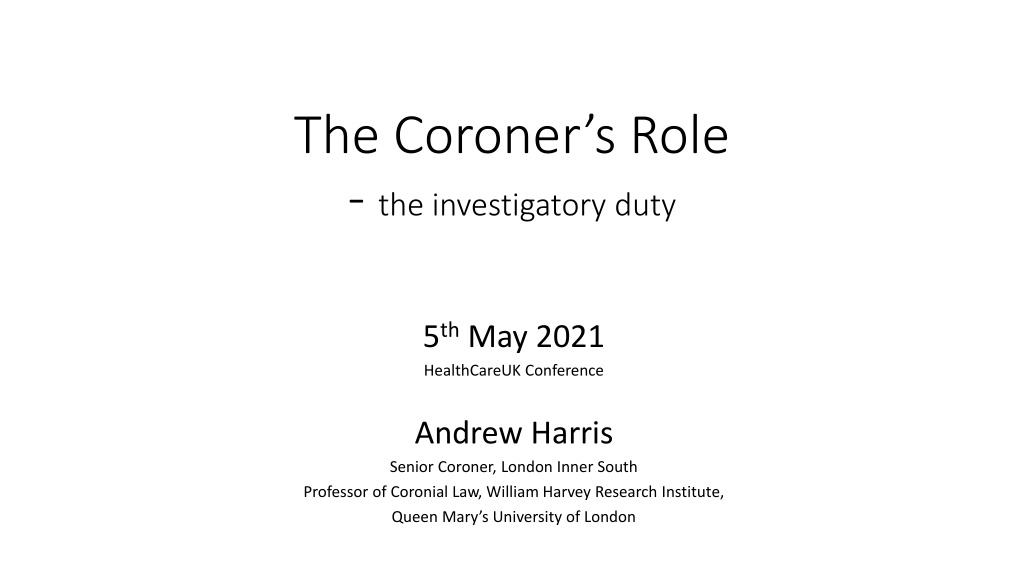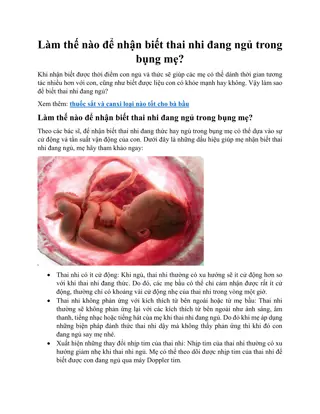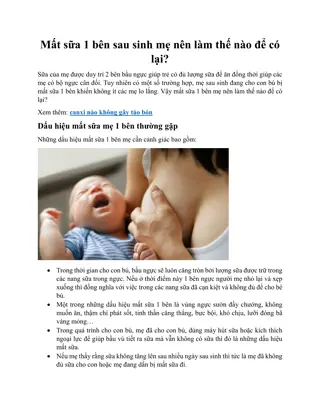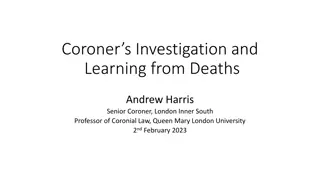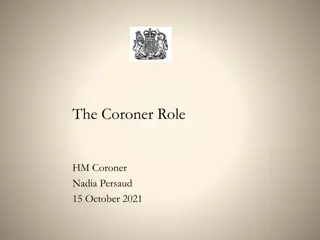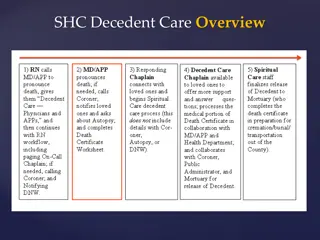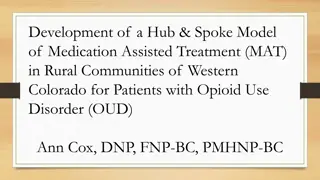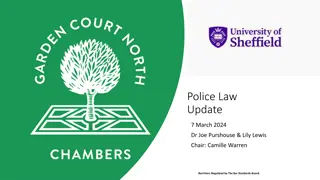Understanding the Role of a Coroner in the Investigatory Process
Exploring the pivotal role of a coroner in determining the cause of death, conducting investigations, and providing insights into the legal processes involved in cases of unknown or unnatural deaths. The article delves into the responsibilities, procedures, powers, and importance of coroners in safeguarding legal interests and advancing knowledge.
Download Presentation

Please find below an Image/Link to download the presentation.
The content on the website is provided AS IS for your information and personal use only. It may not be sold, licensed, or shared on other websites without obtaining consent from the author. Download presentation by click this link. If you encounter any issues during the download, it is possible that the publisher has removed the file from their server.
E N D
Presentation Transcript
The Coroners Role - the investigatory duty 5thMay 2021 HealthCareUK Conference Andrew Harris Senior Coroner, London Inner South Professor of Coronial Law, William Harvey Research Institute, Queen Mary s University of London
Role of Coroner 1971 Determine cause of death In inquests 4 questions who where when how died Allay rumours/ suspicion Alert circumstances to prevent further deaths To advance knowledge To preserve legal interests of family and all IPs 2014 Greater responsiveness and accountabilities Brodrick Committee 1971
Judges determinations Criminal Guilty or Not Guilty Civil Whether specific law broken or duty breached Coroner What has caused death What has contributed more than minimally or trivially
Procedures Criminal Adversarial, questioning led by counsel Standard of proof: beyond all reasonable doubt Civil Adversarial, questioning led by counsel Standard of proof: on the balance of probabilities Coroner Inquisitorial, questioning led by coroner Standard of proof: on the balance of probabilities
Powers Criminal Sentencing May victim support, imprisonment Civil Breach, Declaration, Order, Mandamus May compensation, new action, reputation damage Coroner Record of Inquest May lead to Preventing Future Death Report
Coronial Investigation Coroners and Justice Act 2009 (CJA) A senior coroner who is made aware that the body of a deceased person is within that coroners area .. if the coroner has reason to suspect that the cause is death is unknown or the deceased died a violent or unnatural death or the deceased died while in state detention (s1(2) must as soon as practicable conduct an investigation into the person s death (s1(1)) Preliminary enquiries (s1(7))
Deaths in England and Wales (MoJ 2019) 500,000 deaths in England & Wales Doctor issues MCCD for Registrar 40% reported to coroners: 210,900 falling 14% of reported to inquest: 30,000 rising 39% of reported have autopsies: 82,1000 stable Coroner enquires, investigates, issues
DEATH Cause of death natural and known Cause of death not known or unnatural Refer to Coroner: enquiries Clinician issues MCCD Autopsy Open investigation Form A Discontinue investigation Form B Consented autopsy Open inquest Family take MCCD to Registrar of Deaths Record of Inquest sent to Registrar Cremation form Body can be collected, buried, cremated or repatriated
Medical Cause of Death Dr should state MCD whether or not going to coroner/pathologist, mentioning contributory causes 1c underlying caused 1b caused immediate cause 1a Antecedent cause needed: Aspiration insufficient Entries in II contribute to death, on balance of probability, but do not (directly) relate to disease in 1 To best of knowledge and belief: lower than probable Seek advice of Medical Examiner* * Requirement to take reasonable steps to determine MCD: No. 38 Guidance for RMPs on Notification Regs 2019
Source of Referrals to Coroner Hospital Doctors - apply death Notification regulations advised by MEs Police refer deaths in community, mostly unknown cause, declaration as to non suspicious A small number from other sources - Registrars, Hospices, GPs, or members of public Transfers from other coroners Directions from Chief Coroner
Notification of Death Regulations 2019* Exposure/ contact with toxic substance acute not chronic but all industrial. Implications of Kissi-Debra? Use medicinal product, CD, psychoactive substance Violence, trauma, injury, self harm any time eg old RTA Neglect/ self neglect (lack of care ? contributed) Unexpected, mistake, procedure ? contributed Otherwise unnatural (not entirely from disease) In State Detention under MHA section MCD not known, after consultation (not with coroner) *Where reasonable cause to suspect that death is due to or contributed by, more than minimally, trivially or negligibly
Coronavirus Act 2020 Notify if either attending Dr nor other can sign or Dr can sign but not in reasonable time* Don t notify Covid to C just because notifiable for health protection;you can certify Covid if clinically diag and no test /result unavailable No attendance in 28/7 notify C who may tell Registrar to accept MCCD from Dr (NFA) Revised guidance for doctors on certification F66 ONS *Revised guidance to doctors on notification March 2020
Ordering PME where non suspicious Cor should direct as soon as reasonably practicable(Reg 11); but need to know MCCD not possible and consult family Can specify kind of examination (CJA s14 (2)) ?non-invasive Unnatural death - Dr should give C MCCD if attended (BDRA 1953) ? View and tox or none eg non contact RTA, suspension No cause of death Can consultant issue? NFA or secure report and cover with A? Do family object? PIRH, scan, Can override (Manch C ex p Worch 1988 CA) To see if duty to investigate (CJA s14 (1b)) Despite Dr willing to issue MCCD (R v Westmr C ex p Rainer 1968) Autopsy pathologists independently accountable to Coroner Families decide disposal of tissues (HTA). Body release after autopsy but then may have to wait for histology or toxicology
Coronial Investigation PME natural, no reason to investigate B; If not (or if interim certificate) open investigation Coroner has powers to require statements and discloses these to interested persons: how death occurred in direct line of causation Evidence may later enable an investigation to be discontinued (if autopsy done) Form B If not an inquest is opened in public in court
Stigma and whose right to know? Drug misuse; HIV; being gay; criminal record Requests not to disclose Consider relevance Disclosure rights and Data Protection Coroner can redact statements You can be directed that a certain matter may not be disclosed or referred to
Cultural aspects of death 16th century attitudes and beliefs Different religious customs Dominant western denial Less prepared Family disputes Blame Affects attitude to and need for forensics
Unnatural death Medical and Legal Definitions are different: Scientific literature and opinion Natural: Death related to an internal bodily event not influenced by external occurrences Legal: considerations i) Statutory requirements to investigate (industrial, detention) ii) Statutory interpretation unnatural (rules): Not in accordance with physical nature; or at variance with what is usual or expected iii) Case law: C investigates if per se unnatural (RTA /error in surgery); if prima facie natural MCD apply case law
How case law over time changes triggers for investigation 17 yr status asthmaticus died whilst waiting for ambulance - natural death even though earlier ambulance would have saved his life. Now unnatural. R v Poplar Coroner ex p Thomas 1992 Coroner could not investigate removal from ITU and drug causing pneumonia. Now can R v HM Coroner Birmingham and Solihull, exp Cptton QBD (1996) 160 JP 123; [1995] COD 245
Unnatural Unnatural in law is contextual- Touche Little more than unexpected.. Not exclusively in terms of causation. Look at combination of circumstances Wholly unexpected deaths from natural causes which would not have occurred but for culpable human failure (Failure to monitor BP post partum) R v Inner North London Coroner ex p Touche [2001] EWCA Civ 383; Thomas abandoned Where there is a possibility of neglect , even of contributory cause, investigate if unnatural (not negligence) Only possibility of alternative cause of death needed to investigate (delay in diagnosis of septicaemia) Bloom v ADC North London v Whipps Cross Hospital [2004] EWHC 3071 (Admin) Medically natural MCD but legally unnatural death LJ Robert Walker, p61-62 in Touche
Potentially fatal conditions Where a medical intervention fails to prevent death from the underlying fatal cause, even if treatment was wrong, or negligent failure to treat, death is natural R v Birmingham Coroner ex p Benton (1997) Most deaths following emergency treatments are referred, but coroner usually finds natural Medical error unnatural MCD: in law natural Critical to tell coroner whether intervention was an emergency or elective
The elderly Resident Nursing Home Altzheimers, manic depression 1a Bronchopneumonia, II Dementia Should there be an investigation?
What triggers investigation? Wife says he was clammy day before death Possible failure to give antibiotics Inadequate medical records Antipsychotic drug given in unacceptable doses making susceptible to pneumonia Left immobile in bucket chair Excessive focus of coroner on perceived requirement to demonstrate link between death and improper treatment. Goes further than reasonable cause to suspect . Bicknell v HMC Birmingham [2007] EWHC 2547 (Admin)
Cause of falls and NOF 81y, MI, dementia, diabetes; Fall NOF Hypotensive post op, death Day 2 1a Pulm oedema 1b NOF (operated) from fall Unnatural. Inquest 1a Pulm oedema 1b IHD NOF (operated) from fall 1c Old Age Frailty - Natural. If NOK no concerns, no further investigation Evidence for frailty may depend on expert evidence on osteoporosis, muscle weakness
Cause when immunosuppressed 14y AML BM transplant, post op problems 1a Sepsis, 1b AML (GvH disease) A. Family - wrong treatment and CoD, transfers. CC. Inquest: BM - own WCs completely obliterated. 1a MOF 1b Candida sepsis 1c Immunosuppression from stem cell transplant II GvH, relapse AML Unintended conseq nec medical treatment Expert evidence on bone marrow crucial
Sudden death of unknown cause Presumption natural syndromes SIDS but SUDI with virus/ co-sleeping? SUDEP usually natural - underlying cause? SACD exclude drugs, Genetics In schizophrenia Has antipsychotic caused arrhythmia? Case specific contexts. Rule out underlying conditions with expert investigations
Epidemics World since 70s: HIV 75.7m cases, 32.7m died CFR start 100%. UK: 2016 ?all cause mort 0.4% Pre-exposure Prophylaxis trials. R double cost Flu: 400,000 annual deaths in epidemic; PHE: 17,000 annually. 0.1% seasonal mortality Covid: 4.41m cases UK, 128,000 died; 2.9% CFR (2.1% world). 12/20 Age Std Mort (rate/100,000 pop) 234 (flu 25; 51 av) M>60 Mortality 10/1000; Kent variant 13/1000 doctor-4-u.co.uk; www.gov.uk Towards elimination HIV; ncbi.nim.nih; Covid: gov.uk and ONS reports
Covid ? Coronial investigations Many not reported. Initially not autopsied. Now PCRs MCD natural Is there culpable human failure? Wave 1: NHS inappropriate PPE, varying awareness, inadequate procedural protection, lack of testing Wave 2: Care Home Care Home deaths ?Not tested on discharge from hospital, no PPE Wave 3: Transport and service sector exposure Causation problems. Legal Q about remoteness Work Related Deaths Need HSE referral and require Coroner jury Coroner not Q gov policy/ Public Inquiries
